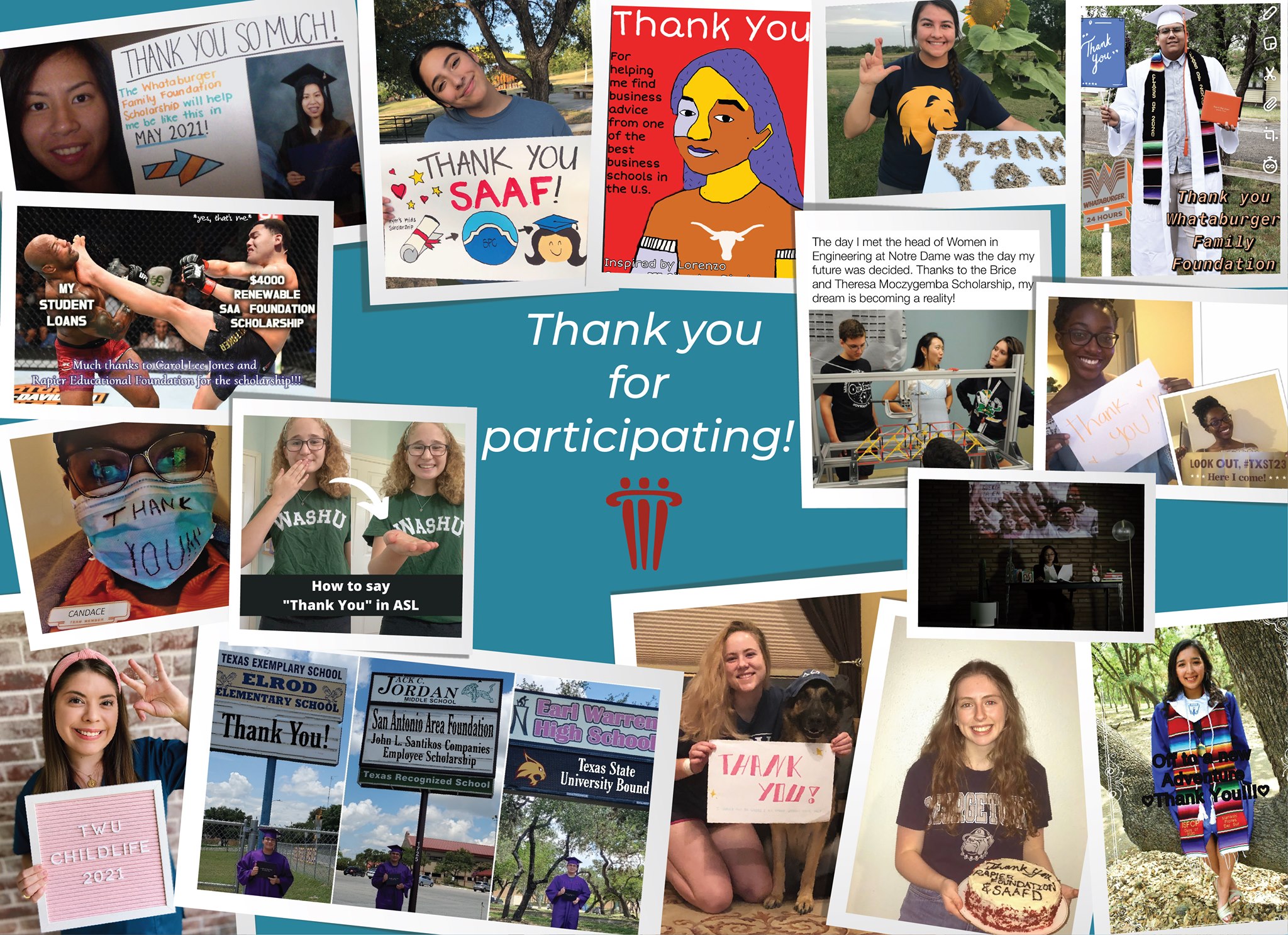Past and current scholars share their experiences and advice on various topics to help you in your college journey.
We understand that college is a completely different world from high school. That is why we’ve invited our past and current scholars to share their experiences and advice on various topics to help you in your college journey.
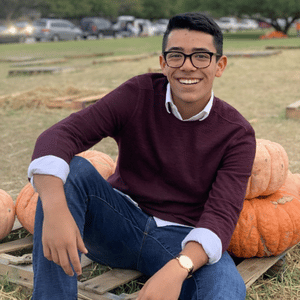
Max Santillana is a current senior at Texas A&M University, College Station, studying Architecture and Business. He graduated from Edison High School in San Antonio, Texas, in 2019 and received the Valero Scholarship and Bartlett Cocke General Contractors Scholarships. Read Santillana’s experience on how he’s managed stress the last few semesters during the pandemic and what self-care looks like for him
Q: College is an exciting time in life and it’s essential to manage stress and maintain self-care. What are some ways that you manage stress during the semester?
A: One way I was able to manage my stress during my time in Aggieland was to take a class that allowed me to leave my worries at the door. For me, that meant joining the Texas A&M wind symphony. We meet three times a week and during our meetings, I can just focus on making music with my peers. Another outlet I have in place is my support system! Making a few friends on a campus of 70,000 really makes it a lot less intimidating.
Q: Self-care looks different for everyone. What are some tips you can provide on how to self-care?
A: Personally, if I feel that my work is taking a significant a toll on me, I’ll either go on a run or play guitar. I’d say the bigger point here is to find a hobby that you enjoy and make that your self-care outlet. I often have to remind myself that I can’t possibly go on a run whenever things start to feel hard. College is challenging and sometimes, the most caring thing you can do for yourself is to learn how to not overcompensate difficulty with too much downtime. I feel like taking these hobbies to an extreme can cause me to procrastinate and become more stressed out.
Q: What stressful challenges have you faced being in school during a global pandemic and how have you overcome them?
A: One of the challenges that I faced during the pandemic was the monotony of it all. Staying in the same desk chair, looking at the same screen as I zoomed into my classes, was tough. Something I did to fix that was to change my study environment when I could. Unless I’m really buckling down on school and have a lot to do, I often have a handful of coffee shops and parks from which I like to work. Doing this helped me a lot since it didn’t feel like I was stuck in the same old routine every day. I’ve even switched floors and study spots in the library too!
Q: What school resources have been the most helpful?
A: The school resource that helped me the most was out academic success center. I graduated high school with a 4.2 GPA and around 30 credit hours, so it felt weird at first to ask someone for help. I used to think that it would mean that I was underperforming if I went to ask someone (a professor or advisor) for assistance. Once I learned that it’s ok to share your problems with people who want to help, my academic coach started to help. We often met around six times a semester and I was able to be fully honest about how I was doing in my classes and how to do better.
Q: What’s your biggest piece of advice for students starting their first year of college?
A: To anyone about to go into their first year of college, I would want them to know that doing well this early in the game sets the trajectory for the rest of their college career. I messed up badly my first semester and am still working my way out of that hole. Make friends, ask questions, work hard, and have fun (but not too much fun, lol). Act in such a way that you will thank yourself now in 10 years.
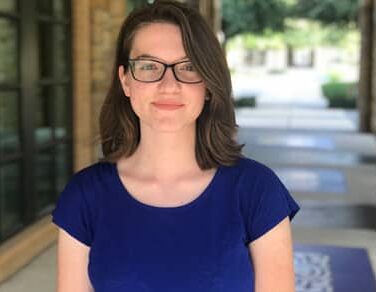
When Brigid Cooley isn’t working hard as the editor-in-chief for The Mesquite, Texas A&M University – San Antonio’s online student newspaper, she’s pushing through her last semester of college. She has been able to pursue a degree in communications with the help of a scholarship from the San Antonio Association of hispanic Journalists.
Her last semester of college is starting off very differently than planned, but she’s adjusting and navigating through the rollercoaster of emotions that would be expected in terms of the current environment. Read more about what Fall 2020 is going to look like for Cooley, how she’s adjusting and her advice on how to stay mentally strong while taking classes during the pandemic.
Q: How will college look for you in Fall 2020?
A: This semester is shaping up to be one of the most involved and possibly most difficult semesters of my college career; two things I never thought I’d say about my last semester of undergrad. Like most students at Texas A&M University – San Antonio, all of my courses are online, meaning that my bedroom is becoming my campus. As editor-in-chief at The Mesquite, my university’s online student newspaper, I am also overseeing a team of six editors through a virtual newsroom. This means my semester will be full of Zoom meetings and classes.
Q: How has COVID changed the way you learn/study? How have you adjusted and what tips do you have for someone struggling?
A: I am lucky because I attended an online high school, so I am somewhat familiar with online learning and the struggles and triumphs that come with it. However, part of what makes me succeed in my studies is having a close relationship with my instructors, which is much harder to accomplish in a completely virtual setting. I’ve found that I’ve adjusted by being more proactive with communication and being really honest with my professors about what’s going on in my life. We’re all trying our best and instructors are usually willing to help you.
Q: What is your advice on staying mentally strong during these uncertain times?
A: Ask for help. A lot of students don’t know this, but colleges usually provide some sort of free student counseling. Use it. Throughout the pandemic, I’ve been receiving support from them and because of that, I’ve been able to navigate the rollercoaster of emotions I face every day.
Q: Is your school providing any additional resources to students adjust to the “new normal”?
A: My university serves a very underprivileged student body, so when we went virtual, a big concern was if students would be able to access classes from home. Another concern was food insecurity among our campus community. My university did a wonderful job addressing the very tangible needs of its students. That being said, I wish there were more solutions for graduates being deprived of a real graduation. I don’t think there’s an easy fix for that conundrum, but I know I’m very sad I won’t be able to walk the stage like I’ve always imagined when I graduate in December.
Q: Any additional tips for students?
A: The sooner students realize how important our role is at our campuses, the sooner we’ll see the changes we desire. Now more than ever is the time to get involved in your campus community, even if you don’t set foot on campus for the next year or so. Students are strong and adaptable and able to persevere, but it’s hard to do it alone. We aren’t alone; that’s why it’s called a student body and a campus community. We have each other to lean on, to cry with, to mourn the loss of our normal college experience … we have each other, even if we aren’t seeing one another face-to-face.

Sisters Alyssa and Claryssa Pacheco, graduates from the Young Woman’s Leadership Academy in San Antonio, both received the Glenda Woods Scholarship from the Area Foundation. Alyssa is currently majoring in political science at Middlebury College in Middlebury, VT and spent the 2020 spring semester studying abroad in England. Claryssa is currently majoring in studio arts at Loyola Marymount University in Los Angeles, CA.
Due to a death in the family, they unexpectedly found themselves having to head back to San Antonio and transition to online learning because of COVID-19. Since last-minute travel accommodations can be extremely costly, they applied for and received the Area Foundation’s Student Emergency Grant to get home to their family.
Read their advice here on how they have been handling the transition to online learning while preparing to take finals during the crisis.
Q: How has the transition to online learning been for you? What tips or resources have you used to help you?
Alyssa: It’s been a hectic transition for me. I was studying abroad before the pandemic, so the time change has made attending group meetings and lectures interesting to say the least. In terms of tools and resources, I suggest marking out all due dates and coursework on a calendar you look at every day and frequently communicating with your professors. The days and nights all blur together for me so making sure I have a clear schedule with my responsibilities laid out has made life infinitely easier. Setting up a clear workspace makes all the difference. Even when I was back at school, if I would try to work on my bed or in a communal area like a living room, I was never as productive as I needed to be. You associate these places with rest and relaxation, so it’s difficult to get into a mindset that is conducive to work. Carving out even the smallest corner of your room and dedicating that to school will help you get your work done much faster.
Claryssa: While at LMU I had immediate access to my professors, the library, and my classmates. If I had a question about my assignments or needed more guidance, it was very easy to get help. The transition to online classes has brought a challenge to this. One of the hurdles has been the difference in time zones. My classes are now much later. This can be difficult when living in a home with five other people (all working/learning from home). The distractions can sometimes get in the way. It’s important to find a spot in your house that gives you enough room to keep your mind focused and free from distraction. It makes it easier to finish assignments and it creates a productive space to study. It’s also crucial to communicate with your family members so that they can support your needs.
Q: What tips do you have for students who may be stressing about the end of the semester, a class they have to possibly retake, or financial aid woes for the next semester?
Alyssa: This might not be the answer that people want to hear, but when it comes to communicating with your college/university, you must be relentless. Professors and advisors want to help you in any way they can, but you have to reach out and tell them exactly what you’re going through. Financial aid is a bit more difficult, but it never hurts to reach out and explain the assistance you will need for next semester. In these times, be patient. Everyone is struggling right now so things are moving a little slower. Give professors and advisors time to process.
Claryssa: During this critical time, students should practice self-forgiveness. There will be those days that are filled with frustration and that is okay. It is normal to feel like that. However, I think it’s important to make decisions that will benefit you academically and mentally. That may include reaching out to other students that are in the same situation and may understand exactly what you’re going through. This allows you to exchange ideas or strategies that can help you during this difficult time. Also, take advantage of being around your family and use them as a support system. We’re all living through this crisis together.
Q: What is one piece of advice you would give to students about relaxation, unwinding and de-stressing techniques that you use?
Alyssa: Every student knows exactly what works for them and my only advice is to not feel guilty for getting through this however you need to. I wake up for my lecture and then nap for a few hours after. I know some people are waking up every day at 8 a.m. and getting all their work done before noon and personally, I could never do that. Every student is different and so everyone’s daily practices will be different. I recommend finishing all your work by dinner because it makes sure you always have a few hours of relaxation at the end of the day.
Claryssa: I think it’s important, more than ever, for students to find a balance between their studies and taking time to relax. It’s going to look different for everyone, but it’s essential to find stress relievers such as listening to music, working out, or participating in family game nights. Make it a part of your weekly schedule and don’t wait until you’re feeling overwhelmed.
Q: How has the Area Foundation’s Student Emergency Grant you applied for helped during this crisis?
Alyssa: As I mentioned before, I was studying abroad in England when my family got notice that my courses were moving online, and my sister was out-of-state in Los Angeles, so it helped a great deal in getting everyone home. This is an uncertain time for everyone and knowing grants like this are available to students is extremely reassuring.
Claryssa: As we all know, making travel accommodations at the last minute can become very costly. That along with moving expenses and finding storage had a huge impact on my family’s finances. While I was in Los Angeles, my older sister was studying abroad in England. The Student Emergency Grant was instrumental in getting my sister and me home.
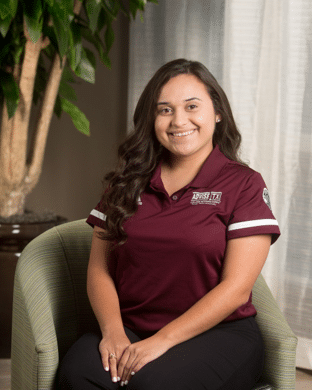
Gissella Quezada is currently a college advisor at a nonprofit that provides college resources to students in select high schools. With the help of the Area Foundation’s Francisco H. Eschauzier, Pathway to Leadership, and Rapier scholarships, Quezada was able to attend Texas A&M University (TAMU), where she received her Bachelor of Arts in psychology. During her freshman and senior year, Quezada had the opportunity to study abroad over spring break. Read her tips on how you can enjoy spring break while staying focused on your studies.
Q: How did you stay focused on your schoolwork, when everyone around you is talking about spring break plans and blowing off assignments?
A: Every spring break, I tried to study abroad with my school. I was able to travel to Paris, Normandy, and Versailles my freshman year. Senior year, I traveled to San Miguel de Allende, Guanajuato. By working with the study abroad office, I was able to focus on my schoolwork prior to the trips and receive college credit. My tips would be to plan around your assignments and school breaks. Catch up with your work before you go on break. If you know you have an exam after spring break, take time to study one hour a day for that class so you’re prepared when the break is over.
Q: How did you prioritize what you spent your money on?
A: I saved any school refunds that I received and set aside money for textbooks, rent, food, and expenses I would foresee on my trips. I always did my best to pay two months worth of rent. As I began working on campus my sophomore year, I put my money toward small things I wanted.
Q: What are your do’s and don’ts concerning spending?
A: Do pay your bills on time – don’t hesitate. If you can align them to a specific date, even better. If you’re working, always save any left over money you have. Make it a habit to save. It’ll benefit you in the long run, especially after graduation. Don’t live paycheck to paycheck. It’s hard as a college student if you rely on your current income to survive. Since you may not be getting a refund over the summer, minimize your spending to stay afloat.
Q: How can students have fun during spring break while staying safe?
A: Think about your actions and the possible outcomes. Spring break is an annual event, but you only have one life. It’s a great time to relax and catch up with old friends and family that you don’t visit often. Try a new hobby, a sport, or read a book. Do things you don’t get to do for yourself during the school year. Always remember to not put yourself in situations that you wouldn’t want to put others in.
Q: What is one piece of advice you would give to students for spring break?
A: Enjoy it. Take this time to recharge for the second half of the semester. It’ll be over before you know it.
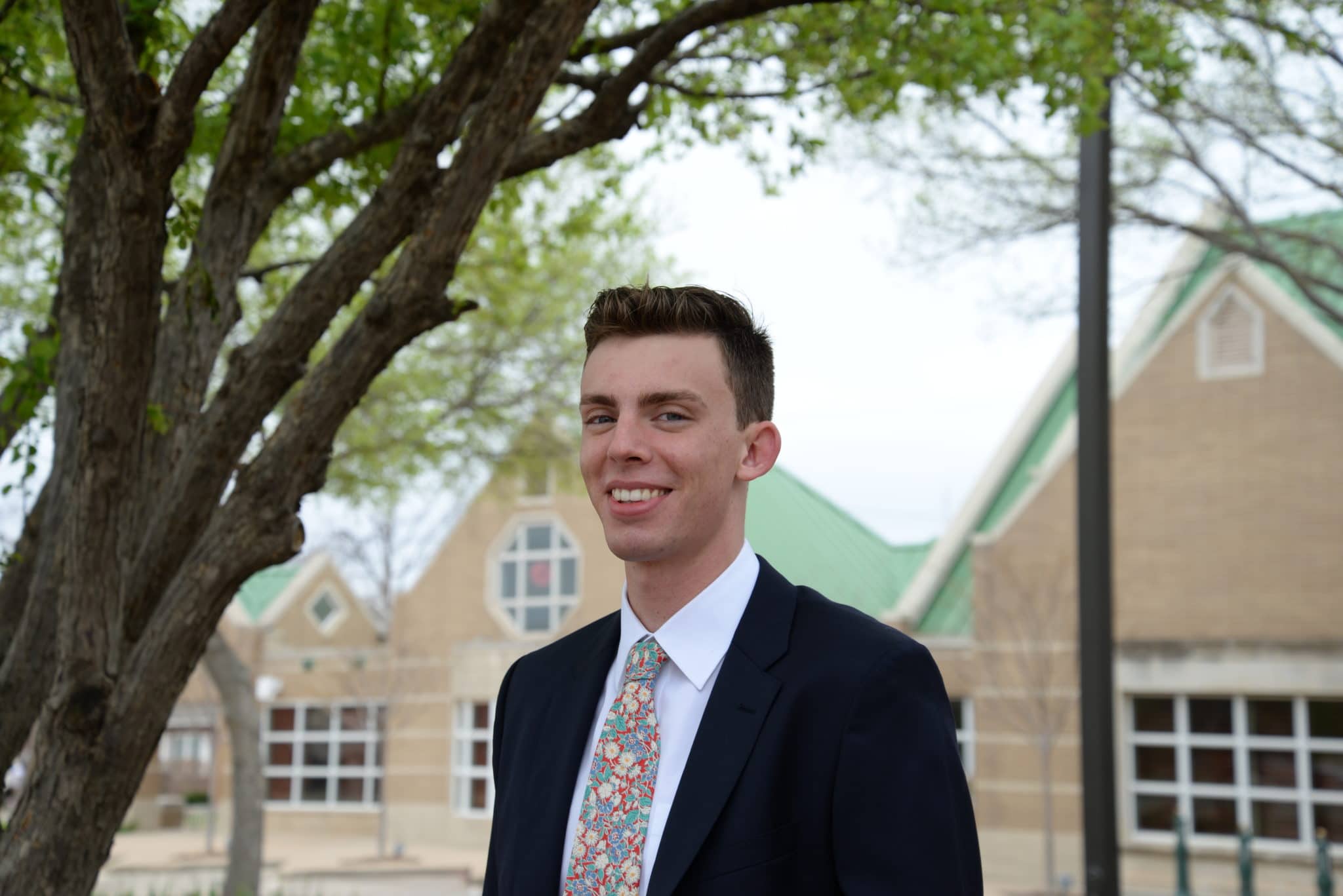
Erik Russell is currently a process engineer for an oil and energy company in Oklahoma City, but before that, he was a student at Rice University, relying on the help of two San Antonio Area Foundation scholarships – the Jimmy & Elizabeth Harper Scholarship and Patricia & Lois Hartman Scholarship. Russell graduated in 2017 with a Bachelor of Science in chemical engineering, and says his financial journey through college is now helping him lead a financially fit lifestyle after college. Here are his tips to help you have a finacially fit experience.
Q: Have you ever been faced with running out of money before month’s end? If so, how did you overcome this obstacle?
A: When I was in college, I had a student job but there were still some months where I overspent. I managed to get my budget back on track by cutting back on my largest expense — eating out or ordering takeout. I planned my meals so I could cook something quick and healthy on weeknights, giving me a little more cash to splurge on the weekend. Also, spending an extra 10 minutes making my lunch before work saves me about $10 a day, which adds up quickly for more money in my pocket.
Q: How do you prioritize what to spend your money on? What are you do’s and dont’s concerning spending?
A: Instead of spending my money on things, I tend to spend my money on activities or experiences like nice meals, concerts, or special events. Outside of necessities, I would say don’t buy an item unless it is something you are likely to enjoy and appreciate for a long time. And of course, hold off on any big purchases unless you have saved the money and are comfortable with your budget.
Q: Do you have a written budget or do you use a software program to help you stay within your budget?
A: I have a written budget that I put together in a spreadsheet as well as an app for tracking all of my planned monthly income and expenses. Many banks now offer budgeting programs or apps that make it easy to see what your spending habits look like and quickly create budgets. There are also many free tools like Mint that can help you create smart spending habits and know when you are spending too much.
Q: What is your advice on getting and using credit cards?
A: Focus on building your credit by paying your bill on time and in full each month. Take advantage of special offers from credit card issuers, but don’t try to meet any special spending goals if they aren’t feasible no matter how enticing the rewards sound. If you expect you will need to carry a balance, look for a card with a low interest rate. The card perks will likely not be as dazzling, but the most important part is the money you save by paying lower interest fees.
Q: What other advice you would give to help students finish school with minimal debt (student loans, credit cards, etc.)?
A: There are various local and federal student loans that offer loan forgiveness. For example, some lenders will forgive all or part of your student loan debt if you meet certain criteria (graduation within four years, certain grade point average, career path, etc.). Be sure to explore programs that offer loan forgiveness and see if they are a fit for your student career. These can help offset the cost of school and you may already meet the criteria.
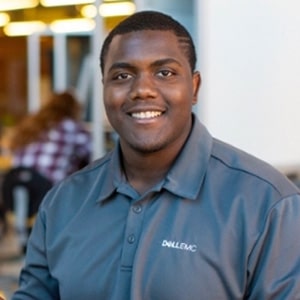
Starjjil Shelvin is currently a senior at Trinity University majoring in Engineering-Science with a minor in mathematics. Last summer, Starjjil interned for the indirect procurement department at Dell Technologies. This internship landed Starjjil a full-time job as the new incoming sustainable sourcing lead for the global operations department at Dell Technologies. Starjjil is excited to graduate this May and begin his transition from college to the professional world.
Q: Why was it important for you to get an internship?
A: It was important for me to obtain an internship because it allowed me to step outside of the classroom setting and apply my knowledge to a real-world atmosphere. Internships allow you to showcase your talents and build your professional network with many potential employers. Additionally, internships are important because they allow a better understanding of the type of career path that I desire; my internship at Dell Technologies provided a valuable stepping stone when deciding on where I would like to continue my professional growth upon graduation from Trinity University.
Q: What resources did you use to find your internships? How soon did you start looking?
A: To find Internships, I utilized career services on campus my freshman year. They did an excellent job perfecting my resume to make sure that I was a competitive candidate. I recommend that it is best to start as early as possible for the best chances of getting contacted by employers. Make sure to print out numerous resumes and never be afraid to hand them out with confidence, engaging eye contact and a firm handshake to start off with remarkable first impressions.
Q: What skills and experience did you gain from your internship(s)?
A: During my internship, I gained professional and proper communication skills from numerous business partners within the company. It is very easy to sit behind a desk and email back and forth, however, the power of face-to-face interaction is much deeper than anything. Interacting with coworkers was fantastic. I talked with several people from all over the globe and had a great time understanding many new experiences from new people of different backgrounds. The main advice is to always focus on your people skills. Employers can always teach skills, but employers cannot teach a person’s character. That must come from within and can often be the deciding factor during the hiring process.
Q: What advice would you give to other students seeking to get the most out of their internships? Also add how an internship can help you land a job?
A: The advice that I would give is to prioritize work-life balance. I understand that it is a priority to get the work done that is asked of you, however, you must also make time to socialize and make connections with others. Many times, employers would prefer hiring someone who lacks skills but has strong character skills. I also recommend showing up early and leaving late. This really stands out and shows that you are eager to learn and that you are not afraid to stay late in case a task needs additional work before a deadline. Internships overall help you land a job by getting you in contact with many great employers; there’s also the added benefit of including professional references to your resume. These added references and connections are a great way to have justified team leadership skills, communication skills, accountability, and adaptability.
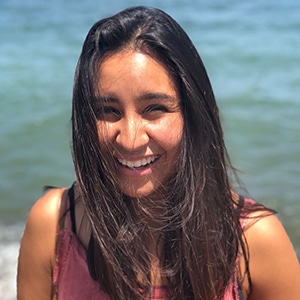
Ilanna Villagran is currently a senior in the Georgetown University School of Foreign Service in Washington D.C., studying culture and politics with a concentration on environmental justice and peacebuilding. She received the San Antonio Area Foundation’s Glenda Woods Scholarship. She has also studied abroad for a full year in Salamanca, Spain and then at the Arava Institute for Environmental Studies in Israel-Palestine. She believes that any student who has the ability to travel abroad with the help of scholarships and financial aid should definitely do so.
Q: How do you balance your school work, extracurricular activities, and having a social life?
A: Having a balanced life, I think, starts with making a routine and sticking to it. Taking five minutes at the start of my day to go over my schedule and prioritizing assignments/study time goes a long way. My friends and I talk about our schedules and plan time to study together and go out on the weekends that works for all of us.
Q: How do you get yourself back on track when you’re feeling overwhelmed?
A: I’ve been lucky enough to find amazing friends who support and challenge me, who help hold me accountable to my goals. I’ve also made sure to seek out a few professors that I trust and respect to help me talk through my academic challenges and guide me through my last semesters in school. Without a network of friends and mentors to confide in, it would be very difficult to get through the times that are overwhelming.
Q: What is one piece of advice you would give to students?
A: The one thing to remember is that your mental health is more important than any assignment, meeting, or class. Take care of yourself by planning, being open and honest with yourself, and choosing your friends wisely. Find someone you feel you can be completely open with, whether it’s a friend, sibling, or mentor and don’t be afraid to be honest with your professors, who are more understanding than you may think. There are always people there willing to help.
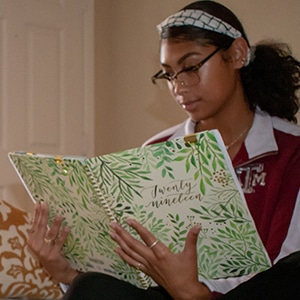
Alaya Keane is currently enrolled at Texas A&M University (TAMU) pursuing a master’s degree in international wildlife conservation. She completed her undergraduate degree at TAMU last spring with a bachelor’s in wildlife and fisheries ecology and conservation with the help of the Rapier Foundation Scholarship, a scholarship fund of the Area Foundation. Alaya loves the environment and Texas.
Q: How do you manage your time when studying for exams?
A: While studying for exams, and even just throughout the semester I live by my planner. I write everything down including when I need to study and what information I need to cover. Using some sort of planner or task tracker can help you maximize productivity and look for any gaps where you can be studying. When things get really hectic, I sometimes even use an hourly planner, so I can keep track of what I should be doing at all times throughout the day. But, a regular planner works just fine for most people!
Q: What are your top 3 – 5 study tips/tricks that have helped you do great on your exams?
A: My saving grace in undergrad was the five-day study plan! If you don’t quite know how to study for exams yet:
Q: What is one piece of advice you would give to students?
A: Learn more about yourself and prioritize your well-being! No one told me this in undergrad (sounds pretty silly to be told to know who you are, right), but eventually I understood that this meant learning when I am the most productive, how I study, how I know when I am tired, etc. For example, I am most productive during the late afternoon and throughout the evening, so I know that this time is when I need to prioritize my studying and I can do other tasks at different times. I also know that once it hits about midnight, I simply can’t study anymore, and that my body needs to rest. This is different for everybody, and it takes some time to figure out, but it makes all the difference.
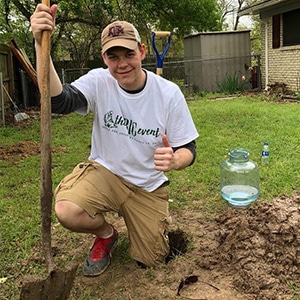
Jared Pauletti is a freshman at Texas A&M University studying aerospace engineering. Jared is a recipient of the Rapier Educational Foundation scholarship of the San Antonio Area Foundation. He is immensely thankful that he was selected to receive the scholarship, which helped him pursue engineering at one of the nation’s top engineering schools. Without the Foundation’s financial assistance, Jared would not have been able to devote the time necessary to secure his internships. He is passionate about computing, flight, and cybersecurity, and he hopes to one day combine those fields and work on the cutting edge of space technology. In the Summer of 2017, he was selected to be the Network Operations Intern at GVTC Communications, and this summer he looks forward to participating in the NASA summer intern program at the Independent Verification & Validation facility in West Virginia working on cybersecurity applied to satellites.
Q: What resources did you use to find your internship opportunities?
A: When I am applying for internships, I have found that the best way to search for an opportunity is to use Google or a job searching site. They are posted throughout the year, so it helps to check for new ones frequently. In addition to searching on the internet, if you have a specific company in mind it also helps to actively seek an internship; getting in contact with a company may show your passion and the persistence and help you secure an interview.
Q: Why did you decide to take an internship over the summer break?
A: I took an internship because I wanted to make money over the summer, but I also wanted to work toward my future career. An internship fit both criteria, so I decided that it was the best use of my time. I knew that I did not want to just waste time sitting at home over the summer, so for me the choice was to seek out an internship or find some other work, and I knew that an internship would better serve me in the future, so I opted to be a summer intern.
Q: What were other fun ways you stayed productive during the summer?
A: I helped with Eagle Scout projects and did a few other service activities. I also taught myself a bit of programming and tried to build a 3D printer (I haven’t gotten it working yet). This coming summer I am planning on taking core classes online while doing my internship. Taking your core classes online or through community college is a cost-effective way to quickly get started on classes toward your major and make yourself a more attractive candidate for possible internship positions.
Q: What is one piece of advice you would give to students?
A: Apply to internships if they look interesting; don’t let the requirements stop you. Sometimes the qualifications listed are hard cutoffs, but more often they act more as guidelines. The companies hiring do not expect you to already know everything because you are applying to be an intern, not a full-time employee. Internships are a learning experience like no other because they mostly exist to help you learn without the expectation of delivery that a full-time job often carries, so make the most of them!
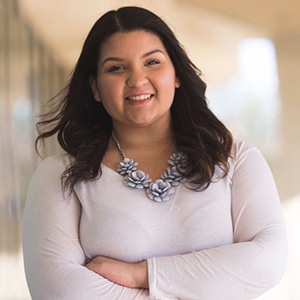
Originally from Venezuela and raised in Kissimmee, FL, Valentina is the student trustee on American University’s Board of Trustees, becoming the first LatinX person to hold the role and serving as the only undergraduate student on the university’s strategic planning committee. Most recently, she interned with District of Columbia Public Schools supporting Career and Technical Education programs and college and career counselors. Valentina served as the vice president of AU College Democrats where she founded a mentorship program and organized events with elected officials and policy leaders. As a Constitutional Law teaching assistant, Valentina co-developed a 60-hour civics curriculum for middle schoolers in DC, integrating arts and social studies pedagogy. She has also interned at DC consulting firms, Women’s Foreign Policy Group, and the U.S. Senate. This summer, she will be attending Carnegie Mellon as a Public Policy and International Affairs Fellow. If it were not for San Antonio Area Foundation’s Rapier Educational Foundation scholarship, she would have never had the opportunity to attend college and have the opportunities to work in politics and policy to create equitable education policy reforms that reduce barriers to access in higher education.
Q: What resources did you use to find your internship opportunities?
A: I found my first internship through a relationship I built with a faculty member at the end of my first year in college. She believed in my work ethic, story, and potential and connected me to one of her mentors. Since then, all my supervisors have continued sharing their networks with me, leading to other opportunities and expanding my skill set. To prepare, once it was time to interview and prove my potential, I used the career services at my college to improve my resume, used LinkedIn to talk to people that worked at places I was interested in, and most importantly, talked to my peers who had already gone through a lot of these experiences.
Q: Why did you decide to take an internship over the summer break?
A: As a low-income student, I recognize that being comfortable with the bare minimum is not enough. I wanted to put my knowledge into action and have hands-on experience about what a potential job would entail. With a competitive job market, it is crucial that I developed the experience future employers are looking for. More importantly, I viewed internships as a stepping stone to learning more about the different platforms for me to make an impact in the world.
Q: What are 3 things you learned from your internships?
Q: What is one piece of advice you would give to students?
A: No goal is ever too large. Be confident and believe in yourself. Use LinkedIn to find people that work in the place you are interested in working at and set up an informational interview before you apply. This will help you decide if the goal is something you are interested in and give you an advantage when you are applying.
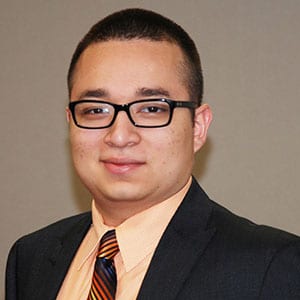
Jose Treviño, a past scholarship recipient, shares how he learned to manage his time and how he stayed focused while in college. Treviño received a bachelor’s in environmental sciences from the University of Texas at Rio Grande Valley. He is a published author in the International Journal of Life Sciences Research for his research using natural agents to make cloudy fresh water clear.
Q: What tools do you use to help you stay organized?
A: A must, to me, is to get some type of organizer whether physical or digital and be detailed with anything and everything that you must do for the day, week, month, year, and years. Always think things through, do not just think short term, rather long term as well because it helps to have something to look forward to and work toward.
Q: How do you prepare for mid-terms and finals week?
A: I make sure that I get plenty of rest those weeks because it’s good to study, work on papers, projects, and presentations, but resting your mind and body is also a must. In addition, I try to pace myself and make sure to have an objective(s) everyday of what I hope to accomplish, that way I can feel good knowing that I am making progress those weeks and build up confidence for those strenuous mid-terms and finals.
Q: What is one piece of advice you would give to students?
A: You should enjoy the little detours to the fullest because that’s where you’ll find the things more important than what you want. In life its more about the journey than the destination.
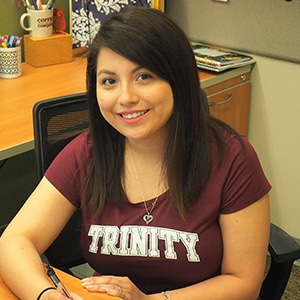
Arizbeth Posada, a past San Antonio Area Foundation scholarship recipient, shares her first year college experience through a Q & A. Posada graduated from Trinity University with a double major in communications and marketing. She currently works at the Area Foundation as a communications specialist.
Q: Think about your first impressions of being on a campus: What surprised you? Which things were exactly as you expected?
A: I went into my freshman year expecting to be surrounded by a very different culture and found it to be true. It took me awhile to adjust to everyone, but eventually I found myself enjoying the campus and making meaningful connections.
One of the things that surprised me was enjoying the small sized classrooms. I had originally thought it wouldn’t make much of a difference to my learning experience, but I was wrong. I tended to get bored in the larger classrooms where interaction was minimal.
Q: What was one challenge you experienced during your first year of college? How did you handle it?
A: My biggest challenge during my first year was time management. What helped me stay on track was investing in a customizable agenda with plenty of writing space. I wrote down everything from assignments to work hours to reminders to take a break! If you purchase one, I suggest making sure you are comfortable with the weight and size. You might find yourself carrying this everywhere.
Q: What did you wish you had known when you first started college?
A: I wish I had known healthier habits. Many times, I would skip lunch or stay up very late. It can really take a toll on you after a while. I found I always did best on exams when I ate and slept well versus trying to study all night.
Q: Which school resources were the most helpful to you?
A: I found professors to be the most helpful resource. I would recommend taking advantage of any open-door hours they may have. Most are willing to help not only with their course, but any advice you may need.
Q: What is one piece of advice you would give to students?
A: Plan and keep track of your degree plan starting now, even if you are unsure of what major you want to declare. Use your first two years to fulfill any required common curriculum and use these courses to explore your passion and interests. Come senior year, you will be thankful to have everything in order.
San Antonio Area Foundation scholarship recipients have previously shared messages of thanks with their scholarship donors. Students submit creative photo entries each year through a fun and engaging social media contest. Check them out!

